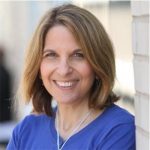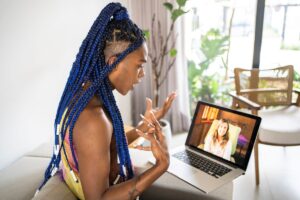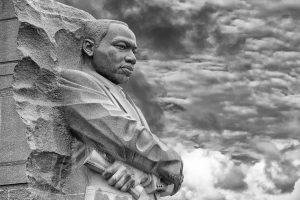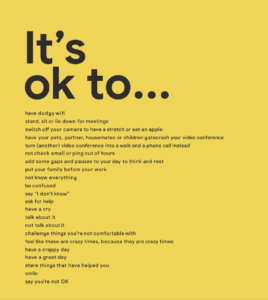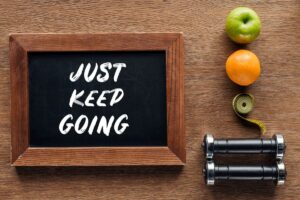Getting out of her lane drives MMC’s CEO to new heights
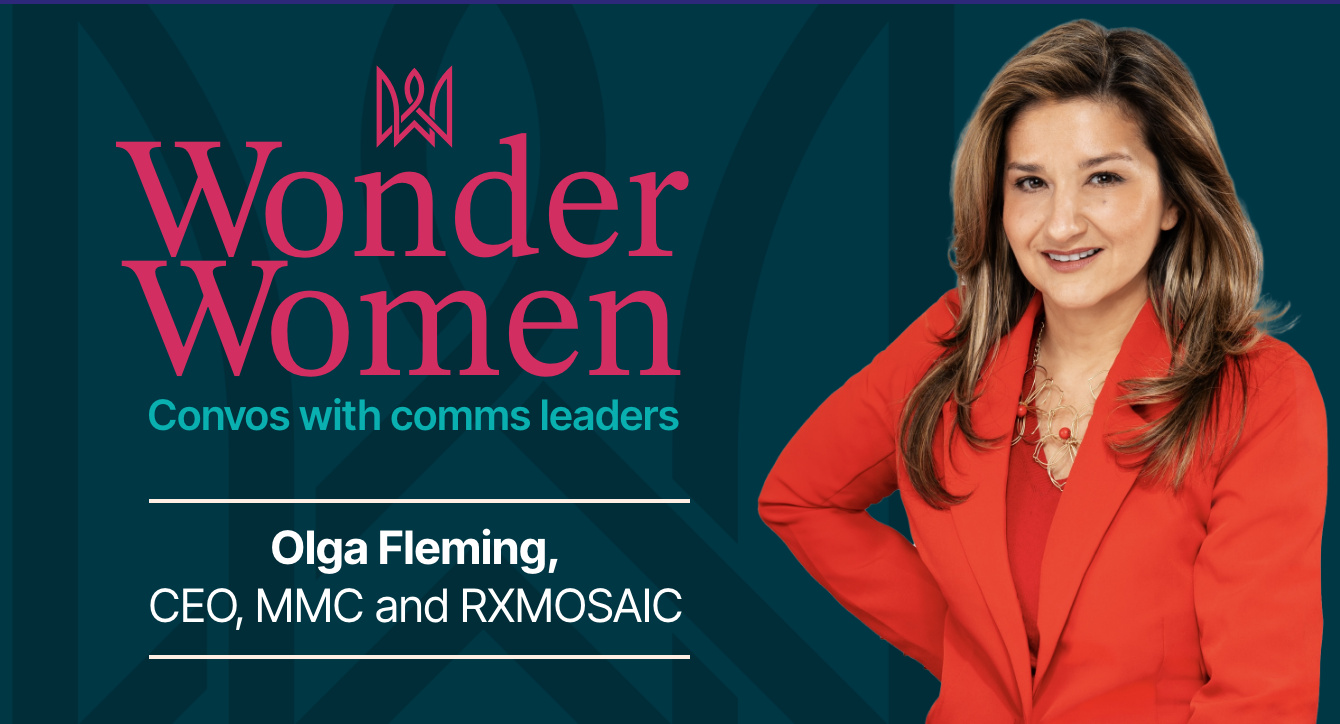
As told to Diane Schwartz, CEO of Ragan Communications.
When I first sat down for coffee with Olga Fleming, CEO of Marina Maher Communications, during the Cannes Innovation Festival in June, it was clear that I was sitting with a woman who knew her worth and who listened and connected with passion. We instantly discovered things we had in common – our alma mater, our daughters spending time in Denmark and attending Wake Forest University, being empty nesters, leading a company.
In this first in a series on Women in Communications, you’ll discover how Fleming leads amid the challenges of a hybrid workplace, client demands and a desire to be “artfully disruptive.”
Origin Story
DIANE: How did you get here? Share some significant stops along your journey to CEO.
OLGA: I’ve always said: What often describes a remarkable career is not so much the places you’ve been, but the people’s lives you changed along the way.
My story begins in Europe. I was born in Greece and moved to the U.S. when I was around 7 years old. My father was a serial entrepreneur who was chasing the American Dream. He did quite well for himself and instilled in me a strong work ethic and a passion for creating new opportunities for people. Initially, I thought I wanted to join the foreign service, being intrigued by public policy and international relations. However, after working at an embassy in the press and information office, I fell in love with communications and its impact on the world stage.
After attending American University, I moved back to New York and began my communications journey at an investor relations and financial communications firm. I loved shaping a company’s persona and showcasing its value proposition from a strategic standpoint. This passion led me to start my own agency with a few colleagues in my late 20s, which was very successful and eventually sold to a large holding company.
 Over the past 20 years, I’ve founded, led, and rebranded numerous communications agencies and built successful practices for large companies, gaining a comprehensive view of the industry —from financial and corporate communications to product, health, and consumer sectors. This perspective has allowed me to architect fully integrated teams, create impactful 360-degree campaigns that differentiate brands in noisy industries, and create new paths in emerging categories.
Over the past 20 years, I’ve founded, led, and rebranded numerous communications agencies and built successful practices for large companies, gaining a comprehensive view of the industry —from financial and corporate communications to product, health, and consumer sectors. This perspective has allowed me to architect fully integrated teams, create impactful 360-degree campaigns that differentiate brands in noisy industries, and create new paths in emerging categories.DIANE: Marina Maher handed the baton to you in February 2023: what was that feeling like? What have you learned from her?
OLGA: Joining MMC was incredibly exciting because Marina Maher created what I consider to be an incubator brand at a time when large agencies dominated. She is an industry legend who crafted a hybrid PR/creative agency focused on women’s communications, developing an audience-first approach back in 1983, a rarity at the time. This female-focused approach, along with placing creativity at the center, made the agency unique and a model others try to emulate. When I joined as president of healthcare and corporate in late 2021, the agency was experiencing a post-pandemic rebirth, aligning perfectly with my aspirations and skills.
Marina’s decision to take on a new role within Omnicom and pass the baton to me felt natural because we were very much in sync in our views on the industry, growth, and building an impactful culture.
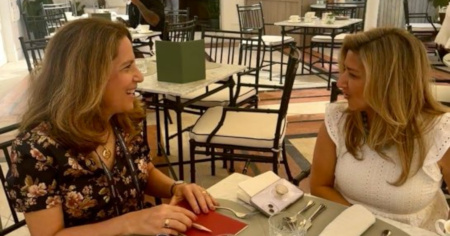
Leadership
DIANE: What’s the most important quality a comms leader must possess?
OLGA: Vulnerability. While many might cite other qualities, I believe great leadership requires being vulnerable and accepting the fact that you may not know everything. You may fail, and it is essential for leaders to rely on others to bring new perspectives, solve problems and leverage opportunities. Leaders must be comfortable embracing vulnerability to foster an environment where diverse ideas can flourish, taking risks and embracing differing viewpoints to drive progress.
DIANE: What is the one thing every agency CEO must do to lead a successful firm?
OLGA: While it’s hard to pinpoint just one thing agency CEOs must do to lead a successful firm, a common mistake new leaders make is surrounding themselves with like-minded individuals. My approach has always been to build a team of diverse thinkers who challenge my opinions. Constructive discourse and differing viewpoints are critical to moving a business forward and providing clients with the best possible thinking.
DIANE: How would you describe your leadership style?
OLGA: Collaborative. I enjoy examining challenges and opportunities from all angles with a team of smart, creative people around the table. My goal is to create spaces where everyone can contribute, regardless of their level or experience.
DIANE: How do you inspire your team?
OLGA: I inspire my team to paint outside the lines and take calculated risks by creating a safe space for experimentation. I encourage my team to leverage the external world, culture, and our differences to inspire new directions, even if we’re not entirely sure they will work. That’s what’s going to foster progress.
As a group, we fuse powerful consumer insights with rich cultural intelligence to build emotional connections between consumers and brands, and to be successful we place a high value on collaboration, creativity, community and self-care.
DIANE: How do you manage conflict, and can you share an example?
OLGA: I try to defuse situations by understanding the emotions and feelings behind the challenge. Conflict often arises from disappointment, pressure, or stress. By addressing these underlying emotions and fostering transparent and honest communication, we can find new directions and resolve misunderstandings. I call this a “WIN-WIN conversation,” where both parties clearly articulate What I Need (WIN). Unsaid expectations are what lead to conflict most of the times.
Culture
DIANE: With remote work, how do you help the next generation stay connected, learn from their peers, and even for veteran comms people to learn from younger generations?
OLGA: MMC operates in a hybrid work culture, gradually bringing people back into the office.
Our artfully disruptive ethos, paired with our challenger by choice mentality, drives our desire and excitement to create programming that reconnects and inspires. We embody our “Human First” value with our “UMatter” employee engagement program. We host full day off-site experiences for our entire team that connect, educate, celebrate, and motivate. We have also restarted employee-led clubs like the art and book clubs, and we offer a variety of wellness activities such as laughter yoga and monthly meditation.
The Work
DIANE: Your firm bills itself as “artfully disruptive” – share a few examples of how you’ve leveraged culture to disrupt storytelling.
OLGA: For a pharma company wanting to reduce stigma around eczema for parents and children, we partnered with Paramount and Nickelodeon’s “Blue’s Clues & You” to create a character named Freda Felt who has eczema. We know parents are watching TV with their preschool-age children — we educated them in a comforting way about how to talk to their child about eczema. This was the first time Nickelodeon partnered with a brand to create a new character and our approach helped parents relate to the issue in a non-threatening and relatable way, embedding important information in an entertaining format.
Another example is our work with CoverGirl, where we introduced the first male makeup spokesperson in 2016. This was at a time when inclusivity was becoming more prominent. We’ve continued to define the cultural zeitgeist and artfully disrupt the beauty industry, recently launched a campaign with Sally Hansen featuring former Duke University men’s basketball player and NBA hopeful Jared McCain — who is vocal on social media about his love of painting his nails —promoting nail painting among men, reflecting a cultural shift we actively listened to and embraced.
DIANE: How exactly do you “artfully disrupt”?
OLGA: It all starts with our audience-first mentality: delivering the right message to the right consumer with the right voices on the right platforms. We fuse powerful consumer insights with rich cultural intelligence to build emotional connections between people & brands. Our proprietary data helps us unlock understanding, inform strategy and inspire creativity. Ultimately, it builds to a successful client campaign with inherently shareable and measurable content.
DIANE: Your firm specializes in marketing to women – what’s unique about marketing to women versus men?
 OLGA: Marina founded the agency to give a voice to specific audiences, disrupting communications in the process. Today, we continue to follow client needs across various audiences, not just marketing to women. Our goal is to provide authentic storytelling that creates lasting bonds and loyalty by understanding and addressing the unique experiences of different audiences.
OLGA: Marina founded the agency to give a voice to specific audiences, disrupting communications in the process. Today, we continue to follow client needs across various audiences, not just marketing to women. Our goal is to provide authentic storytelling that creates lasting bonds and loyalty by understanding and addressing the unique experiences of different audiences.DIANE: What are a few major trends and developments on your mind?
OLGA: Digital transformation and AI integration are, of course, top of mind for communicators. I’m constantly thinking about, how can we maximize digital tools to streamline operations, enhance data analysis and personalize communications? How can we better use predictive analytics to predict outcomes of campaigns before they’re live in market? And quite frankly, how are these developments going to impact the workforce?
A few other trends on my mind are:
- Purpose-driven branding, which has permeated all that we do. Companies need to stand for broader social, environmental and ethical values that is aligned with their brand values, mission, and vision for the future.
- Employee engagement and maintaining a strong culture in a hybrid work environment. How do we inspire, motivate and develop staff we don’t see every day?
- DEI and the understanding of cultural sensitivities, which require a deep understanding of audience nuances.
DIANE: For women in business, there’s been some progress. At Fortune 500 companies, 11% of CEOs are women, and 30% of board members are women (per Pew Research Center). This is some progress, but how can we improve these numbers?
OLGA: First and foremost, the best way to improve the progress of women in business is mentorship and sponsorship programs. I always coach our junior people that regardless if you’ve been in the industry for one week or 10 years, you should always be looking out for mentors who you can learn from, who you can use as sounding boards and who can also advocate for you.
We need to be very transparent with communicating promotion paths. There is no room for ambiguity around promotion paths – the steps need to be clear so that women understand how they can advance their careers.
Flexible work policies are also critical for both women and men. Work-life balance is something that keeps our minds sharp, so we should be embracing flexible hours, parental leave and creating grace and space for all types of caregiving responsibilities.
Lastly, we need to involve men in gender diversity initiatives and encourage them to become allies in promoting equality and helping us to advocate. Because at the end of the day we are all going to be that much better if we work together.
Self
DIANE: Take us through a typical workday.
OLGA: I wake up around 6:30, have a cup of coffee, and start my day with the New York Times puzzles – Connections is my current favorite. After checking emails, I commute from Long Island to the office, catching up on correspondence during the train ride. My day is filled with meetings, both internal and with clients. I make it a point to walk around and check in with colleagues. How was their vacation? How was the cake at their son’s birthday party? What are they watching? And getting updates on their adorable pooches. After work, I review the next day’s tasks on the train ride home and unwind with an episode or two of a show—currently, it’s “Monk.” I end the day with dinner and a nice log stroll with my husband and our dog Keeley.
DIANE: Personal habits that work? A habit you want to shed?
OLGA: I value alone time in the morning and evening for calm and reflection. I’m trying to reduce my phone usage, recognizing our societal addiction to phones and striving to change that dynamic.
DIANE: Take us through a typical weekend day.
OLGA: My weekends vary, often filled with activities with my husband now that we’re empty nesters. We enjoy exploring new places, trying new restaurants, or taking our dog on walks. In the fall, our weekends revolve around traveling to watch our son play football in college.
DIANE: What are you still working on improving?
OLGA: Eating cleaner and being more present in meetings. Our phones can be a huge distraction, and I’m working on minimizing that.
DIANE: Work-life harmony – if you do it, how do you do it?
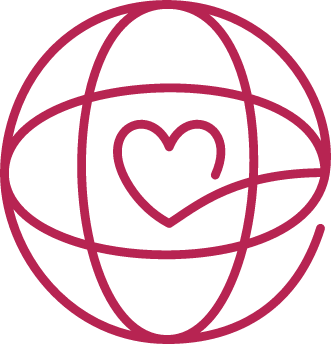 OLGA: Finding work-life harmony took time. About 15 years ago, I realized I was the one controlling my interaction with the world. I started setting boundaries around what I spent time on and what I could let go of. This prioritization was a game-changer, and I encourage others to do the same.
OLGA: Finding work-life harmony took time. About 15 years ago, I realized I was the one controlling my interaction with the world. I started setting boundaries around what I spent time on and what I could let go of. This prioritization was a game-changer, and I encourage others to do the same.Other Tidbits

Hometown & Family:
I was born in Athens, Greece, and moved to New York City at age 7. Growing up in Manhattan was fabulous. I have a younger brother and my family is incredibly close.
After high school, I attended American University in D.C., where I met my husband. We now live on Long Island and have three children: Our two girls are out of college (one is a PA, the other an engineer), and our son is a sophomore in college.

Favorite Book: (current)
“Something Major: The New Playbook for Women at Work, Randi Braun.”

Best Advice:
Always act as if you’re already in the position you aspire to. Take on projects, go the extra mile, ask questions and step out of your comfort zone. This mindset can lead to surprising and rewarding outcomes.
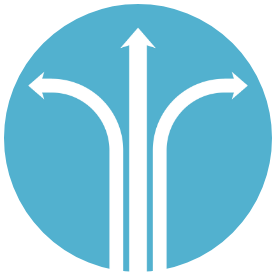
Worst Advice:
The worst advice anyone can give has to be sticking strictly to your job description as you go about your day-to-day at work.
I’ve seen this with some managers who keep people confined within specific lanes, not giving them the opportunity to grow or think differently. To build truly well-rounded professionals, we need to give people the chance to paint outside the lines. If you’re in a situation where you’re not allowed to flex, explore, or learn new skillsets you should potentially consider changing your situation.

Best Mistake:
One year into my first job, I was speaking with the Wall Street Journal about a client’s earnings. Unfortunately, I learned the hard way that even when you say things are off the record, they are not necessarily off the record. I was quoted in the paper saying something that really should have been off the record. I certainly learned my lesson!
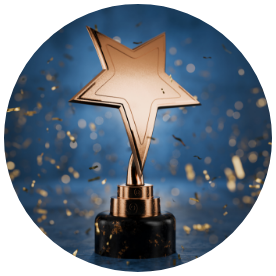
Industry Mentors:
Donna Imperato, Chris Foster, Marina Maher
To all Wonder Women: join Ragan at the Women’s Business Summit & Retreat on Sept 18-20 at Park Hyatt Aviara Resort, Carlsbad, CA

